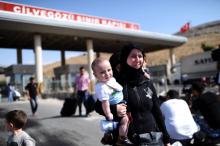WEA

When a head of state is responsible for the deaths of 100,000 of his people and has used chemical weapons against innocent civilians — the world needs to respond. In one massive attack, the evidence appears to show that 1,429 people, including 400 children, suffered horrible deaths from chemical weapons banned by the international community. That is a profound moral crisis that requires an equivalent moral response. Doing nothing is not an option. But how should we respond, and what are moral principles for that response?
For Christians, I would suggest there are two principles that should guide our thinking. Other people of faith and moral sensibility might agree with this two-fold moral compass.
Not all Catholics appreciated Pope Benedict XVI’s staunch defense of Christian orthodoxy, traditional marriage, and life from conception to natural death. But American evangelicals sure did.
As word spread on Monday of Benedict’s resignation, many evangelicals lamented the impending loss of a powerful spokesman for their conservative causes.
“Pope Benedict XVI has exemplified moral courage and an unwavering commitment to the Gospel message,” said Ralph Reed, chairman of the Faith & Freedom Coalition, a conservative Christian political group.
“We honor him for his lifelong service to the Lord and his inestimable intellectual contribution to Christian orthodoxy.”
The high praise — “evangelical Benedictions,” you might say — extended beyond U.S. borders as well.